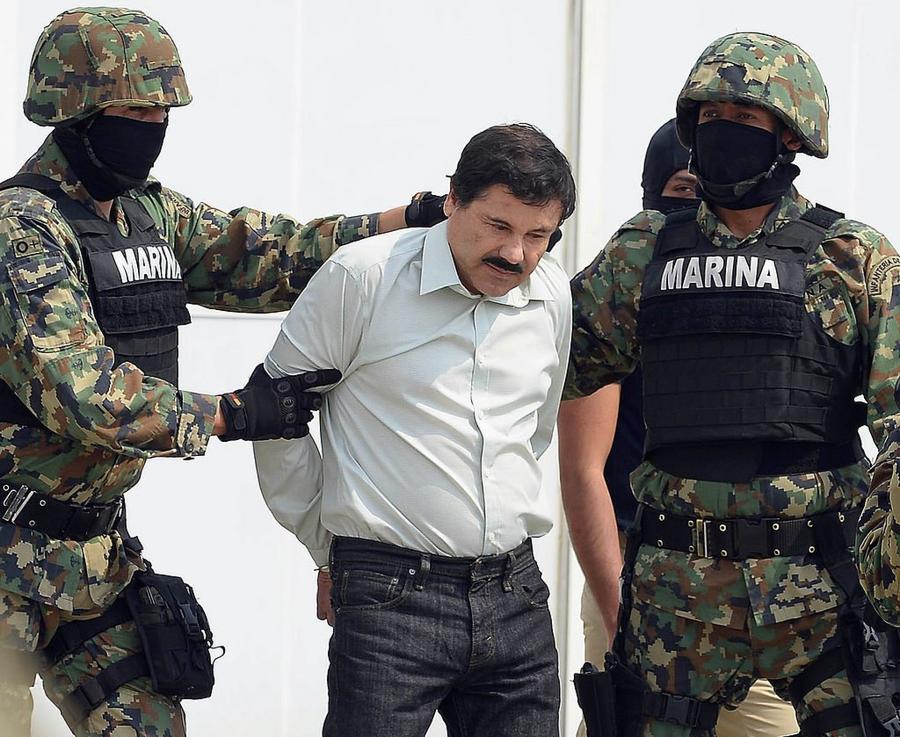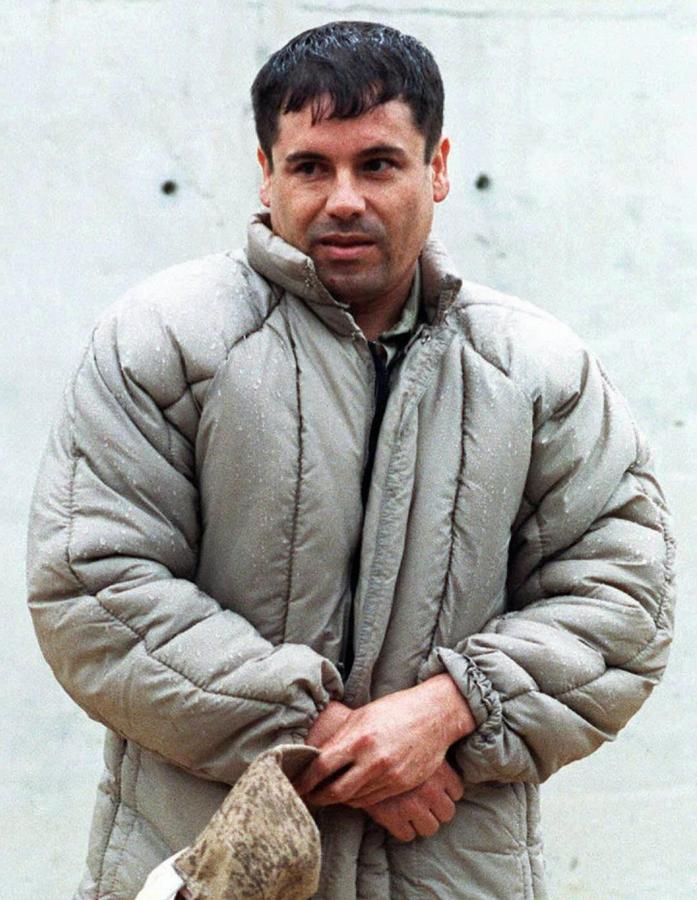Late last night, Mexican drug agents finally captured ruthless billionaire fugitive drug lord Joaquin "El Chapo" Guzman, at a resort in Mazatlan. Guzman, who was hiding out with an unidentified female companion, has been on the run since his daring escape from a Mexican prison 13 years ago. El Chapo has been the #1 most wanted person in the world since Osama Bin Laden was killed in 2011. Prior to Osama's death, El Chapo had been #2 on the list for about a decade. At peak of his power, El Chapo oversaw a violent reign of terror as the head of Mexico's infamous Sinaloa Drug Cartel. The organization was responsible for transporting an estimated 200 tons of cocaine and heroin into the United States alone between 1990 and 2008. The cartel has murdered literally tens of thousands of civilians, police officers, journalists and rival cartel members. Along the way, El Chapo earned a billion dollar personal fortune. Enough to land him on our list of the Richest Drug Lords of all time. Guzman's arrest is a very public victory for both Mexican and American drug agencies, but it will likely bring little interruption to the Sinaloa empire.

El Chapo Guzman Arrested / ALFREDO ESTRELLA/AFP/Getty Images
Joaquín Guzmán Loera's exact birth date is unknown. Most people believe he was either born on December 25, 1954 or April 4, 1957. He was born into a dirt poor family in the foothills of Sierra Madre, the son of a simple cattle rancher. The young Joaquin sold oranges in the streets to help make money to feed his family. He earned the nickname "El Chapo" (Shorty) from his grandfather because Joaquin stands barely over 5 foot 6 inches tall. Like many poor farmers in that region of Mexico, the teenage Joaquin soon began cultivating poppy and marijuana plants for extra cash. He was very successful and soon was kicked out of his parent's house. His father vehemently disapproved of the life El Chapo was hurtling towards.
Once on his own, El Chapo used his experience to land an entry level job with the Sinaloa cartel. Pretty soon he was seen as a rising star within the organization and from the mid 70s to late 80s, El Chapo was in charge of all logistics for the Sinaloa cartel. El Chapo proved his talents by managing a complex system of transportation that involved airplanes, boats, trains, trucks and individual vehicles that transported cocaine and heroin from Mexico mainly into the United States and Europe but also as far as Asia. In the early 90s, with the advent of home made methamphetamine, El Chapo branched the cartel out from being solely a transportation organization into a large scale illicit drug manufacturer. Controlling both manufacturing and distribution of meth caused Sinaloa's profits to explode. Prior to this innovation, Mexican cartels were considered by other global drug organizations to be nothing more than glorified drug mules. They basically earned a small fee for carrying drugs that were manufactured in Colombia to their final marketplaces.

El Chapo Guzman Net Worth/ STR/AFP/Getty Images
The booming business hit a small speed bump when El Chapo was arrested in Guatemala in 1993. At the time of his arrest, Guzman claimed to be an innocent farmer who earned just $6000 a month. He was returned to Mexico and sentenced to 20 years in prison. He ended up serving eight years of that sentence before masterminding a fairly simple escape plan that involved a laundry basket and a $2.5 million bribe to several prison guards. Upon his escape, the United States offered a $5 million bounty for El Chapo's head. Mexican authorities offered an additional $3 million bounty.
El Chapo stayed on the run for the next 13 years until his arrest earlier today. During his time as a fugitive, Guzman continued to oversee and expand the operations of the Sinaloa cartel. Over the next decade, Chapo and his cartel's power increased exponentially. The DEA even believed El Chapo passed Pablo Escobar was the biggest drug lord of all time, referring to him as the "godfather of the drug world". In 2011, Forbes magazine named El Chapo the 10th richest person in Mexico with a personal net worth of $1 billion. Today, the Sinaloa cartel is widely considered the most powerful and largest drug trafficking organization on the planet.

El Chapo Guzman / ALFREDO ESTRELLA/AFP/Getty Images
When Mexican authorities finally captured El Chapo, they also discovered a cache of nearly 100 large firearms, 36 handguns, a rocket launcher and two grenade launchers. As we learned from the death of Pablo Escobar, killing the kingpin doesn't exactly cripple a drug organization. While El Chapo's arrest is a big victory, and will probably be felt by the Sinaloa cartel, it will hardly affect the organization's ability to function. Just as El Chapo took over from after his successor was captured, some unnamed Sinaloa lieutenant is probably getting promoted as we speak.
/2017/05/GettyImages-621793032.jpg)
/2017/02/GettyImages-480949770.jpg)
/2017/07/GettyImages-480490174.jpg)
/2018/11/GettyImages-52242812-1-e1541703554359.jpg)
/2017/05/cruz-1.jpg)
/2019/01/chap2.jpg)
:strip_exif()/2015/09/GettyImages-476575299.jpg)
/2009/09/Cristiano-Ronaldo.jpg)
/2009/09/Jennifer-Aniston.jpg)
/2019/10/denzel-washington-1.jpg)
/2009/09/Brad-Pitt.jpg)
/2020/06/taylor.png)
:strip_exif()/2009/09/P-Diddy.jpg)
/2020/04/Megan-Fox.jpg)
/2020/02/Angelina-Jolie.png)
/2018/03/GettyImages-821622848.jpg)
/2009/11/George-Clooney.jpg)
/2019/04/rr.jpg)
/2019/11/GettyImages-1094653148.jpg)
/2020/01/lopez3.jpg)
/2017/02/GettyImages-528215436.jpg)